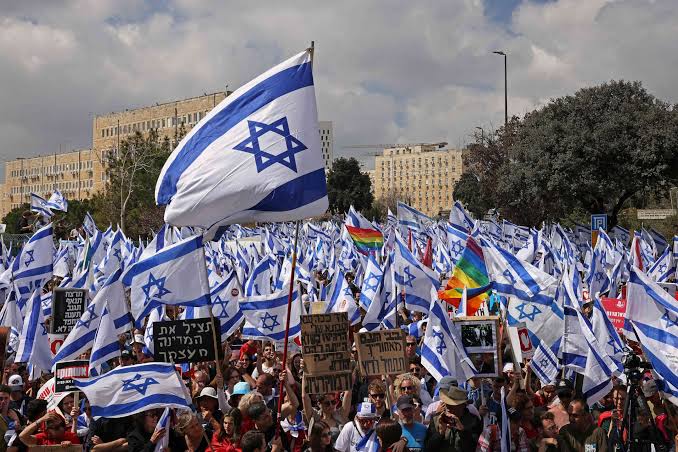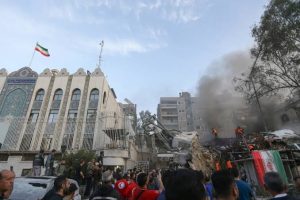
Israeli Protests Intensify Over Hostage Deaths: Netanyahu Under Fire
A wave of protests has engulfed Israel following the deaths of six hostages held by Hamas in Gaza. The public’s outrage has placed Prime Minister Benjamin Netanyahu at the centre of a political storm, with calls for his resignation echoing across the nation. Many Israelis are demanding accountability for what they see as a severe failure of leadership.
Shattered Hopes: The Hostage Tragedy Unveiled
On 7 October 2023, Hamas launched an attack on Israel, resulting in approximately 1,200 deaths and the capture of around 250 hostages. Among them were six hostages whose deaths have recently sparked widespread protests. For nearly 11 months, the United States, Qatar, and Egypt engaged in negotiations to secure their release, but a ceasefire agreement remained elusive. On 1 September 2024, the Israeli military announced the discovery of the bodies of these six hostages in a tunnel in Rafah, southern Gaza. Reports indicate they were executed at close range by Hamas militants. The Israeli Ministry of Health confirmed these details, delivering a devastating blow to the nation’s hopes for their safe return.
Hamas: Leadership and Objectives
Hamas, a Palestinian Sunni-Islamist militant organisation and political party, was founded in 1987 during the First Intifada. An offshoot of the Egyptian Muslim Brotherhood, it aims to establish an Islamic state in historic Palestine, including the territory currently occupied by Israel.
Ismail Haniyeh, the current leader, has headed the organisation’s political bureau since 2017. Hamas, designated a terrorist organisation by several countries, continues its resistance against Israel through both political and armed means.
Motive Behind the Hostage Capture
Hamas captured the hostages to pressure Israel into making concessions, such as easing the Gaza blockade and releasing Palestinian prisoners. This tactic is commonly used in asymmetric warfare to gain leverage.
Profiles of the Six Deceased Hostages
The victims, identified as Hersh Goldberg-Polin, Eden Yerushalmi, Carmel Gat, Almog Sarusi, Alexander Lobanov, and Ori Danino, were reportedly executed by their captors just days before their remains were found.
- Hersh Goldberg-Polin, 23, originally from Berkeley, California, lost part of his left arm during the attack on 7 October. A video released by Hamas in April showed him missing his left hand, sparking renewed calls for his release. His parents became prominent advocates, meeting with international leaders, including U.S. President Joe Biden and Pope Francis, to urge global action.
- Eden Yerushalmi, 24, was training to become a Pilates instructor in Tel Aviv. She was working at the Tribe of Nova music festival when the Hamas attack occurred. Her final message to her family was, “They’ve caught me,” as she was taken captive.
- Carmel Gat, 40, an occupational therapist from Tel Aviv, was kidnapped from her parents’ home in Kibbutz Be’eri, where her parents were killed. Known for her kindness, she reportedly helped fellow captives cope through meditation and yoga.
- Alexander Lobanov, 33, a father of two young children, was taken from the Nova festival, where he worked as a bar manager. He had been aiding others in their escape before he was captured.
- Almog Sarusi, 27, was known for his love of travel and music, often seen with his guitar. He was abducted from the festival after staying with his wounded girlfriend, who tragically lost her life in the attack.
- Ori Danino, 25, the eldest of five siblings, was seized while trying to assist others in fleeing the Nova festival. He had aspirations to study electrical engineering and was cherished for his ambition and love for the outdoors.
The deaths of these individuals have left a deep scar on the nation, fuelling demands for accountability and a reassessment of the government’s approach to such crises.
Nationwide Outrage and Protests
In the aftermath of the discovery, widespread protests erupted across Israel on 2 September 2024. Media reports estimated that as many as 500,000 people took to the streets in cities such as Jerusalem and Tel Aviv. Demonstrators expressed frustration and anger, accusing the government of failing to secure a ceasefire that might have saved the hostages. The protests, among the largest since the conflict began, featured demonstrators holding pictures of the deceased hostages and waving flags symbolising the demand for their release.
Criticism of Netanyahu’s Leadership
Prime Minister Netanyahu has found himself at the centre of a fierce backlash. Protesters have accused him of prioritising his political survival over the safety of the hostages, arguing that his government’s hardline stance led to unnecessary deaths. In Tel Aviv, clashes between protesters and police became common, as demonstrators blocked major roads and intersections. In Jerusalem, protesters gathered outside Netanyahu’s official residence, demanding his resignation.
Netanyahu’s Response: Defiance Amidst Crisis
On the evening of 2 September 2024, Netanyahu addressed the nation in a televised speech. He issued a heartfelt apology, asking for forgiveness from the Israeli people for failing to bring the hostages home alive. Despite expressing regret, Netanyahu maintained a firm stance on military strategy, insisting that Israel must continue to control the Philadelphi Corridor—a key area along the Egypt-Gaza border—which he described as crucial for national security.
The Controversial Military Approach
Netanyahu’s commitment to military pressure, rather than pursuing a ceasefire, has been a major point of contention. He argued that relinquishing control of the Philadelphi Corridor would undermine Israel’s security and allow Hamas to regroup. This position has been increasingly challenged within Israel and by international allies.
Calls for Netanyahu’s Resignation
As the protests gain momentum, so do the calls for Netanyahu to step down. Many Israelis, including the families of the deceased hostages, are openly criticising the Prime Minister for what they see as a catastrophic failure of leadership. The demand for new elections is growing, with a significant portion of the population believing that Netanyahu’s government has lost its legitimacy.
International Pressure
The hostage crisis has also drawn significant international attention. U.S. President Joe Biden has publicly expressed dissatisfaction with Netanyahu’s handling of the situation, stating that more could have been done to ensure the safety of the hostages. Biden’s comments have added to the mounting pressure on Netanyahu, who is now facing criticism not only from within Israel but also from key international partners.
Conclusion: A Call to Action for Accountability and Justice
The deaths of the six hostages have deepened divisions within Israeli society and highlighted the need for greater accountability and adherence to international human rights laws. The United Nations, through various conventions and resolutions, including the Geneva Conventions of 1949, the International Covenant on Civil and Political Rights (ICCPR) of 1966, and the United Nations Convention Against Hostage-Taking of 1979, has established clear standards for the protection of civilians and hostages in conflict situations. These standards must be upheld to prevent further loss of life and ensure justice for the victims.
The international community must hold all actors accountable for their actions in this conflict. The United Nations and other global institutions must push for an independent investigation into the circumstances surrounding the deaths of these hostages, ensuring that those responsible are brought to justice. Furthermore, Israel must reconsider its approach to the conflict in Gaza, prioritising diplomatic efforts and negotiations in line with international law to secure sustainable peace.
As protests continue to unfold, the Israeli government must listen to the voices of its people and the international community. The demand for change is clear: Israel must align its actions with the principles enshrined in international law, protect the lives of its citizens, and work towards a peaceful resolution to the conflict. The future of Netanyahu’s leadership and Israel’s position on the global stage will be determined by how these demands are addressed in the coming days and weeks.
Aric Jabari is the Editorial Director at the Sixteenth Council



